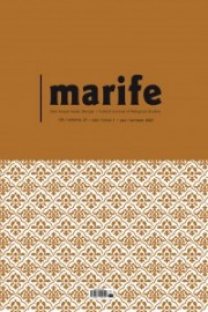Yahudilikte Sadaka
Yoksulluk; insanlık tarihi boyunca en yaygın sosyal problemlerden biridir. Bu yüzden dinlerin büyük çoğunluğu bu sorunu çözmeyi amaçlamış ve yoksulluğun ortadan kaldırılması veya en azından azaltılması yönünde benzer çözümler ortaya koymuşlardır. Diğer dinlerde olduğu gibi Yahudilikte de yoksul kimselere yardım edilmesi önemli bir sosyal ve dinî sorumluluktur. Bu bağlamda bu çalışmada Yahudilikte sadaka anlayışı ve Yahudi geleneğindeki önemi ele alınmıştır. Araştırmanın ana konusunu teşkil eden Yahudilikte sadaka geleneği, Yahudi Kutsal Kitabı’ndaki yardım ve sadakayla ilgili referansların değerlendirilmesi ve daha sonraki dönemde bunların Talmud literatüründeki yorumları ve detaylandırılmasıyla incelenmiştir. Bu bağlamda, sadakanın mahiyeti, kimlere ve nasıl verileceği gibi fıkhi konulara temas edilmiştir. Bunun yanında tarihi süreç içerisinde sadaka anlayışının geçirmiş olduğu değişime dikkat çekilmiştir. Talmud Dönemi Yahudiliğinden sonraki dönem olan Modern Dönem Yahudiliğindeki sadaka anlayışının geçirmiş olduğu anlam değişiklikleri ve kurumsal boyutu ele alınmıştır
Anahtar Kelimeler:
Sadaka, Hayırseverlik, Yahudilik, Talmud, Safed Kabalası
Charity in Judaism
Charity in Judaism Poverty is one of the most common social problems throughout human history. Hence, many religions aimed to solve this problem and showed similar solutions and approaches for the reduction of poverty. As in other religions, helping poor people is a crucial social and religious responsibility in Judaism. In this context, the concept of charity and its im- portance in Judaism tradition has been examined in this study. The scope of this study is to study the charity tradition in Judaism, the evaluation of charity references in the Jew- ish Scripture, and then the analysis of the interpretation and details of this charity tradi- tion in the Talmud literature in later periods. At this juncture, we will discuss some “reli- gious laws” (halakhah) such as the nature of charity, who may take charity, and how it may be given. Then, we gave special emphasis on the changing understanding of charity in the Judaic tradition in the historical processes of this religion. More specially, we exam- ined the meaning and institutional change of the pertinent concept following the Talmu- dic Period; namely in Modern Judaism
Keywords:
Tzedakah, Charity, Judaism, Talmud, Safed Kabbalah.,
- Yayın Aralığı: Yılda 2 Sayı
- Başlangıç: 31.05.2001
- Yayıncı: Yediveren Kitap
Sayıdaki Diğer Makaleler
Kur'an Yorumunda Mezhepsel Farklılığın Dil Kurallarına Yansıması -Akıbet Lâmı Örneği
Çocukluk Döneminde Duygusal Gelişim ve Din Eğitimi
Duhâ Suresi 7 ve İnşirah Suresi 2. Ayetler Bağlamında Nübüvvet Öncesi Hz. Peygamber’in İnancı
Muhyiddîn İbnü’l-Arabî’ye Göre Rüya ve Tabiri
Kur’an Yorumunda Mezhepsel Farklılığın Dil Kurallarına Yansıması -Akıbet Lâmı Örneği
İslam’ın Teşekkül Döneminde Yahudi Kültürü
Eğitimcilik Yönüyle Ebu Hanife
Molla Fenârî’ye Göre Varlıkların Zuhûrunda İlâhî İsimlerin Rolü
Muhyiddîn İbnü’l-Arabî’ye Göre Rüya ve Tabiri
Molla Fenârî’ye Göre Varlıkların Zuhûrunda İlâhî İsimlerin Rolü
